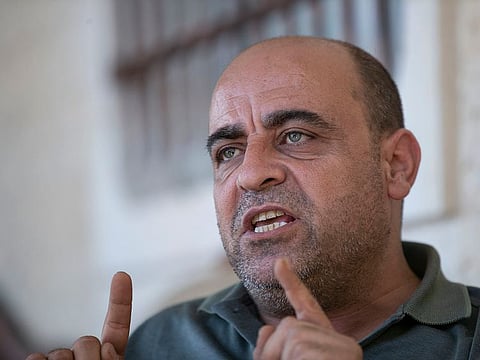Palestinian leadership needs urgent introspection
Killing of Palestinian activist Nizar Banat has further undermined PA’s legitimacy

The death of Palestinian activist and fierce critic of the Palestinian Authority (PA) and President Mahmoud Abbas, Nizar Banat, while in custody of Palestinian security forces last Thursday has triggered unprecedented wave of condemnation both at home and abroad. Banat, 43, was arrested in “violent circumstances” while in his Hebron home on Thursday morning only to turn up dead a few hours later.
“The autopsy showed injuries represented by bruises and abrasions in many areas of the body,” the PA’s Independent Commission for Human Rights (ICHR) said.
Lawyers for Justice Spokesman Muhannad Karajah said that the PA security services were responsible for his demise. “What happened with Nizar Banat is an assassination,” he said. “By killing Nizar Banat, the [Palestinian] Authority confirms today that it is a repressive authority that threatens any human rights defender and every person is subjected to a process of political arrest.”
An independent probe
PA security forces dispersed protests, calling for Abbas’ resignation, in Ramallah on Thursday using tear gas and batons. Larger protests were held on Friday during Banat’s funeral in Hebron and across the West Bank. Banat’s family and lawyers rejected the PA’s decision to investigate his death and called for an independent probe.
The legitimacy of the PA is in question. Critics that include key figures in Fatah say that Abbas has become an authoritarian leader who refuses to cede power while failing to end intra-Palestinian rift.
PA’s silencing of activists is not new and has been documented for years by local and international human rights organisations. In October 2018 Human Rights Watch (HRW) published a report that criticised both the PA and Hamas for setting up “machineries of repression to crush dissent, including through the use of torture.”
It accused both of carrying out “scores of arbitrary arrests for peaceful criticism of the authorities, particularly on social media, among independent journalists, on university campuses, and at demonstrations.” The PA and Hamas also targeted each others’ supporters in Gaza and the West Bank.
“The arrests for nonviolent speech acts constitute serious violations of international human rights law, in contravention of legal obligations imposed through Palestine’s accession to major international human rights treaties over the last five years. The torture as practised by both the PA and Hamas may amount to a crime against humanity, given its systematic practice over many years,” the HRW reports added.
US backed peace process
Abbas, an architect of Oslo Accords, continues to believe that negotiating with Israel will deliver a colony based on the two-state solution. But the US backed peace process has been suspended for almost a decade now and over the past quarter of century Israel has violated agreement that was signed with the PLO.
This begs the question of what purpose does the PA serve? Banat was critical of the PA’s corruption; an issue that has been raised by a number of watchdogs over the years. In 2018 the Council on Foreign Relations in the US pointed to a report published by the Coalition for Accountability and Integrity that cited examples of PA corruption which concluded that “the rule of law is weak both because the parliament never meets to pass laws and due to executive interference: the judiciary and the prosecution in the West Bank and Gaza Strip continue to lack independence.”
It added that government jobs, which are prized due to the weak private economy, are awarded on the basis of cronyism rather than merit. Fake jobs that sap the treasury are tolerated citing the Palestine Airlines, which no longer exists, as an example.
The reality is that the PA has become a burden on the Palestinian people, a cover for continued Israeli occupation and a hindrance for unification. This is why the US and Israel are only interested in the survival of the PA as a body and not its actions. Its survival will only maintain a gruesome status quo. The killing of Banat is a major milestone that should force the Palestinian leadership to face the fact that its legitimacy among its people has long expired.
Osama Al Sharif is a journalist and political commentator based in Amman


